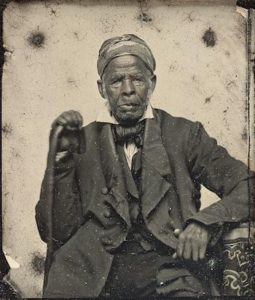
Omar Ibn Sa'id
*This date in 1770 is celebrated as the birth date of Omar ibn Sa'id, a Black Muslim slave, scholar, and author. Omar ibn Sa'id was born in present-day Senegal in, a region along the Middle Senegal River in West Africa, to a wealthy family.
He was an Islamic scholar and a Fula who spent 25 years in Africa studying with prominent Muslim scholars, learning subjects ranging from arithmetic to theology. In 1807, he was a victim of the Middle Passage, captured during a military conflict, enslaved, and taken across the Atlantic Ocean to America. He escaped from his master in Charleston, South Carolina, and journeyed to Fayetteville, North Carolina. There he was recaptured and later sold to James Owen.
On December 3, 1820, Sa'id was converted to Christianity, yet he never let go of his Muslim faith and identity. There are dedications to Muhammad written in his Bible and a card dated 1857 on which he wrote Surat An-Nasr, a short sura which refers to the conversion of non-Muslims to Islam 'in multitudes.' The back of this card contains another person's handwriting in English, misidentifying the sura as the Lord's Prayer and attesting to Omar's status as a good Christian.
Additionally, while others wrote on Omar's behalf and identified him as a Christian, his autobiography and other writings offer a more ambiguous position. In the autobiography, he still provided praise to Muhammad when describing his life in his own country; his references to "Jesus the Messiah," in fact, parallel Quranic descriptions of Jesus and descriptions of Jesus as 'our lord/master' employ the typical Islamic honorific for prophets and is not to be confused with Lord, and description of Jesus as 'bringing grace and truth' (a reference to John 1:14) is equally appropriate to the conception of Jesus in Islam.
Literary analysis of Sa'id’s autobiography suggests that he wrote it for two audiences: the white literates who sought to exploit his conversion to Christianity and Muslim readers who would recognize Qur'anic literary devices and subtext and understand his position as a fellow Muslim living under persecution. In a letter to Sheikh Hunter regarding the autobiography, he apologized for forgetting the "talk" of his homeland. He ended the letter saying: "O my brothers, do not blame me," knowing that Hunter would require Arabic-speaking translators to read the message. Scholar Basima Kamel Shaheen argues that Sa'id’s spiritual ambiguity may have been purposefully cultivated to impress upon a wide readership the injustices of slavery.
Omar ibn Sa'id is widely known for fourteen manuscripts that he wrote in Arabic. Sa'id was also the author of a letter, dated 1819, addressed to James Owen's brother, Major John Owen, written in Arabic and containing numerous Quranic references (including from the above-mentioned Surat Al-Mulk), which also includes several geometric symbols and shapes that point to its possible esoteric intentions. This letter, currently housed in Andover Theological Seminary, is reprinted in Allen Austin's African Muslims in Antebellum America: A Sourcebook. Out of all of his Arabic manuscripts, he is best known for his autobiographical essay, The Life of Omar Ibn Sa'id, written in 1831. It describes some of the events of his life and includes reflections on his steadfast adherence to Islam and his openness towards other "God-fearing" people.
On the surface, the document may seem tolerant towards slavery; however, Said begins it with Surat Al-Mulk, a Qur'an chapter stating that only God has sovereignty over human beings. The manuscript is the only known Arabic autobiography by a slave in America. It was sold within a collection of Sa'id's documents between private collectors before its acquisition by the Library of Congress in 2017. It has since been treated for preservation and made viewable online. Most of Said's other work consisted of Islamic manuscripts in Arabic, including a handwritten copy of some short chapters (surat) from the Qur'an that is now part of the North Carolina Collection in the Wilson Library at the University of North Carolina at Chapel Hill.
Transcribing from memory, Ibn Sa'id made some mistakes in his work, notably at the start of Surat An-Nasr. His Bible, a translation into Arabic published by a missionary society, which has notations in Arabic by Omar, is part of the rare books collection at Davidson College. Said lived into his mid-nineties and was still enslaved at the time of his death in 1864. He was buried in Bladen County, North Carolina. Omar ibn Sa'id was also known as Uncle Moreau and Prince Omeroh. In 1991, a mosque in Fayetteville, North Carolina, renamed itself Masjid Omar ibn Sayyid in his honor.